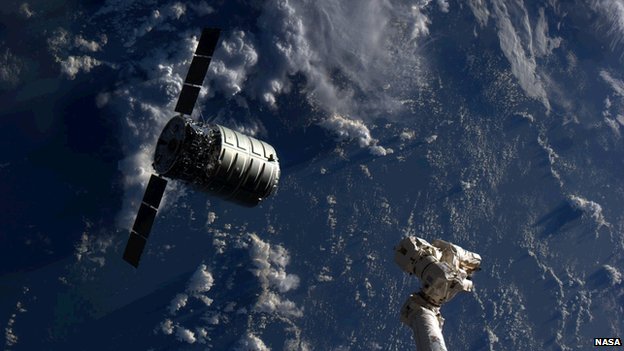The new Cygnus freighter has arrived at the International Space Station (ISS) carrying about 700kg (1,500lb) of food and other supplies.
Astronauts on the platform reached out with a robotic arm and grabbed the vessel at 11:00 GMT.
Cygnus is on a demonstration mission to prove its technology.
It is one of two commercial ventures seeded by Nasa to pick up America’s ISS re-supply requirements following the retirement of the space shuttles.
The new vehicle, developed by the Orbital Sciences Corporation (OSC), made its approach using a mix of GPS, inertial navigation and lidar.
It parked itself a little over 10m under the station, within reach of the Canadarm2.
Operated by astronauts Italian Luca Parmitano and American Karen Nyberg, the robotic limb then grappled the freighter, pulling it into the ISS’s Harmony module.
Capture – the securing of bolts mating Cygnus to Harmony – occurred at 1244 GMT, when the ISS was moving over the Indian Ocean.
Cygnus has arrived at the station a week later than planned after an initial attempt last Sunday encountered software problems.
This left the freighter unable to establish the correct communications and navigation links with the space station.
Cygnus was commanded to loiter more than 2,000km from the ISS while engineers developed, tested and uploaded a patch. The arrival mid-week of a new crew at the station then pushed the second berthing attempt back even further.
Astronauts will wait a day before entering the freighter to start removing its stores.
The current schedule calls for Cygnus to stay at the platform for about a month, after which it will be sent into a destructive dive into the atmosphere.
Nasa is attempting to hand over routine human spaceflight operations in low-Earth orbit to commercial industry, in a way similar to how some large organisations contract out their IT or payroll.
The carriage of freight is the first service to be bought in from external suppliers; the transport of astronauts to and from the station will be the second, later this decade.
The US space agency hopes these arrangements will save it money that can then be invested in exploration missions far beyond Earth, to destinations such as asteroids and Mars.
To this end, it offered Orbital a series of incentive payments to help it develop a cargo-delivery system, with the carrot of a bumper, eight-flight, $1.9bn (£1.2bn) operational contract once it was up and working.
Nasa has also seeded California’s SpaceX company in the development of its Dragon capsule. This vehicle has already completed two missions in a 12-flight, $1.6bn contract.
Cygnus has significant European involvement. The pressurised vessel that holds the cargo is produced in Turin, Italy, by Thales Alenia Space (TAS).
Full article: http://www.bbc.co.uk … environment-24306173

